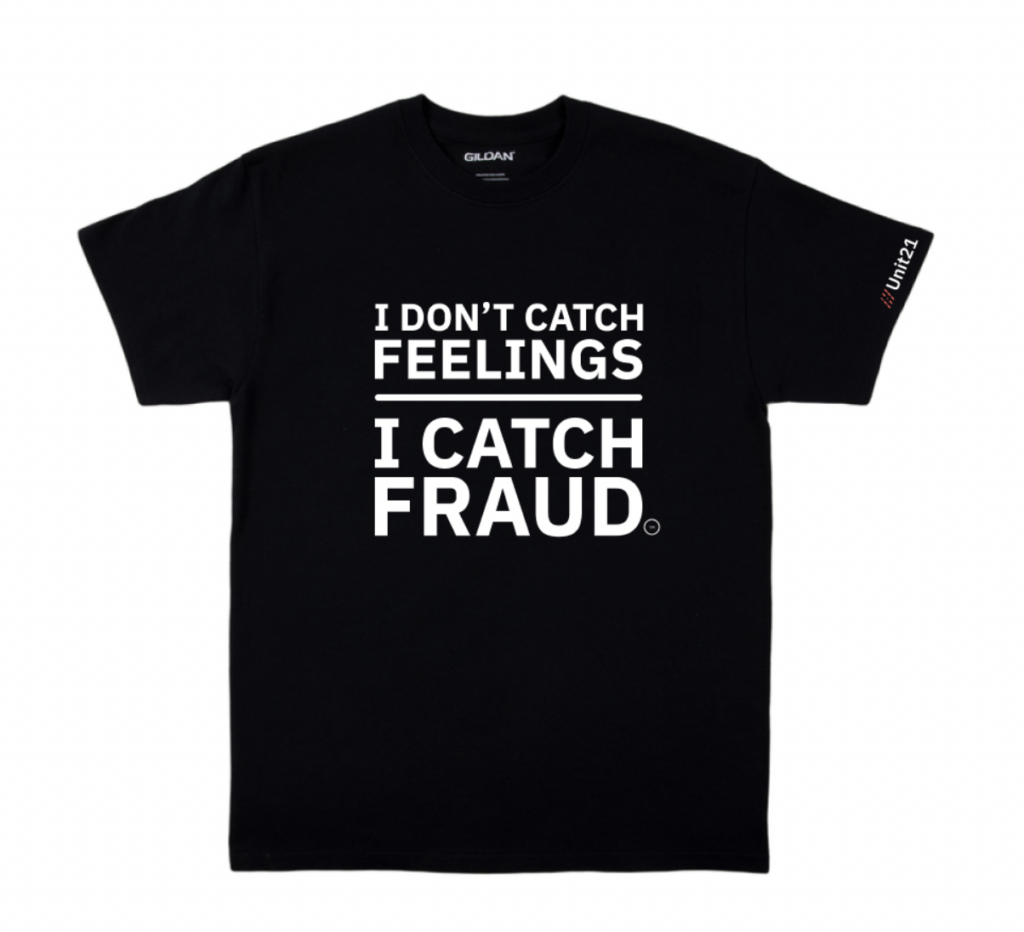30 November 2022 | FinTech
Unit21 CEO Trisha Kothari On Building From First Principles
By
Hey everyone! Some great posts this week that I’m excited to share: first up is a fantastic piece from Unit21 cofounder & CEO Trisha Kothari!
Trisha posted on LinkedIn shortly after the FTX blowup, saying how, in the grand scheme of things, fintech and crypto were still in the really early innings and how investors and operators alike need to see things from a first principles perspective. I’m excited to have her share some thoughts on what exactly that means for founders in the ecosystem today. (A lot of people throw around first principles but not many people can define it…luckily enough, Trisha did an amazing job in her post!)
PS: Unit21 is giving away “I don’t Catch Feelings, I Catch Fraud” shirts to the first 50 people who fill out the form here. Check out the shirt below!

The future is built today.
It’s been a crazy couple weeks. FTX meltdown. Elon oscillating between what a “verified” blue check mark should and should not mean. Layoffs at a scale we haven’t seen since the 2000 dot-com crash. Just when you think we’ve hit the bottom of the barrel, turns out that the barrel is a deep dark well.
And this sentiment is now widespread beyond the topic-of-the-hour that dominates VC Twitter. Public market multiples of fintech companies have come down from 25 times forward revenue a year ago to 3 times a couple months ago. Private investments in fintech is at its lowest point in 7 quarters. Layoffs is a trending topic in Blind. As a founder, hiring our first recruiters last year was ridiculously hard. This week itself, I got 11 inmails from recruiters looking for a new job.
In the last couple weeks, I have had several conversations with my Unit21 teammates, customers, investors, partners, and friends about what the recent series of events means for the future of fintech and crypto. My take is and has always been: go back to the first principles.
If you attend any SF house party, you’ll hear “first principles” thrown around in a sentence at the same rate as “making the world a better place”. So what does first principles mean and how do we actually embody it? First-principles thinking simply means starting from a blank piece of canvas and breaking down every assumption you have. Aristotle derived this phrase to mean “the first basis from which a thing is known”. The alternative to first-principles thinking is comparative or analogy-based thinking where your assumption is that the world will work like it is working today and you build on it. An example of this would be — “I think neobanks are a good business and my friend started a fast-growth neobank for dog owners. No one has successfully built a neobank for cat owners. I will build a neobank for cat owners.” The first-principles version of this would be “How do cat owners interact with the financial system? Are their needs drastically different from non-cat owners? Is their need going to be solved by building a neobank for them? Or is it better solved by combining the financial system with another system they interact with (e.g. supply chain for cat food)?”
It’s worth zooming out and taking a broader look at how financial services will evolve. Do we expect brick-and-mortar banking to be the way 10 years from today that individuals and businesses will interact with the financial ecosystem? Community banks have seen massive consolidation, going from 24,000 in the US in 1970 to 4,800 today. Banking was historically differentiated by location and relationships (think Redwood Credit Union vs San Francisco Fire Credit Union). What does this consolidation mean for the relevance of the historical differentiation in banking? If we had to rebuild banking from the scratch with the technologies we have available today, the financial landscape would look very different.
Do we think brands will embed payments and banking to add a step function change in their revenue stream and make their products sticky? If this happens, how does it change the ecosystem? I recently met a company Buildertrend, a bootstrapped 16-year old business in the construction software space that is looking to add a banking arm to become the core hub for its users financial and work life. The world is filled with traditional non-VC backed businesses like these that solve a real problem and want to increase the value they provide for their customers. While we are early in this journey, the potential for new growth engines is enormous and exciting. It is truly a first-principle way to look at how value is created across the ecosystem.
The critical view of the above takes is that the current iteration of fintech and crypto may neither be optimal nor sustainable. And that can be as true as the fact that today we have incredible potential for a fresh look at the old way of doing things. As an industry, it is our collective responsibility to make the ecosystem safe, understandable, and genuinely useful.
For those building in fintech, it’s a hard moment. When everyone around you is thinking in one flavor, it is incredibly difficult to gather the equanimity needed to think for yourself. However, simply asking yourself “what if I removed this assumption” can enable you to have an independent viewpoint on how the world can/should work.
I remember one of my summer gigs circa 2012 San Francisco. It was funny to hear people talk about “fintech” as if it is a new word in their dictionary. We are barely a decade in and it’s clear that the way future generations will interact with money will be significantly different than we can even imagine today. I can’t wait for the next decade in this evolution.
Let’s ignore the noise. And build the future today.